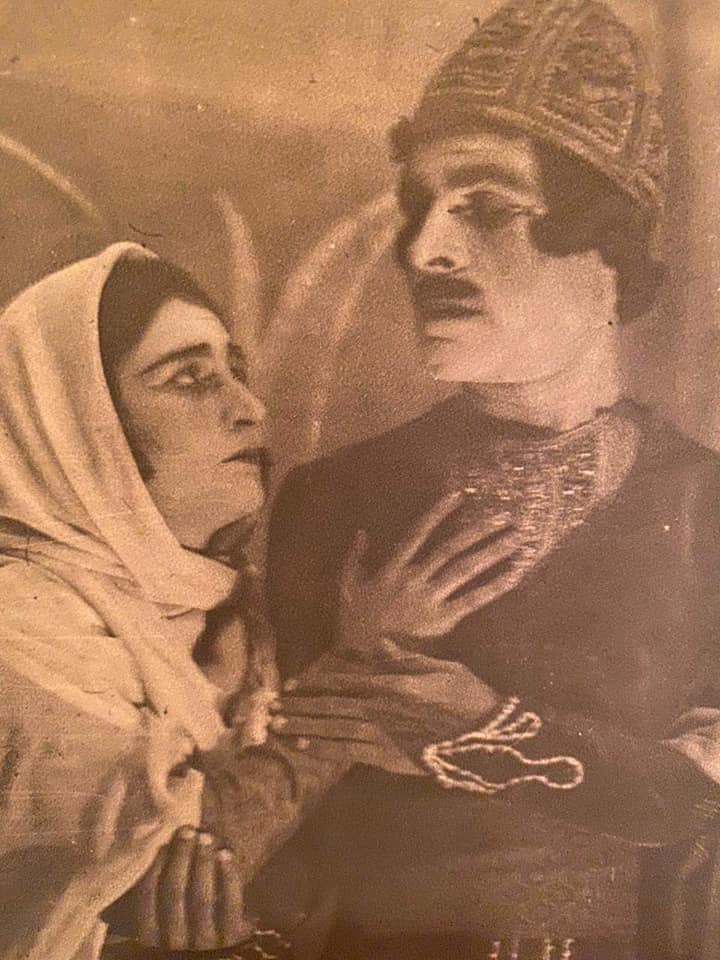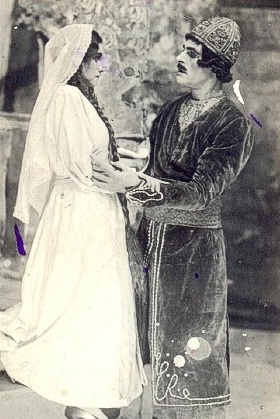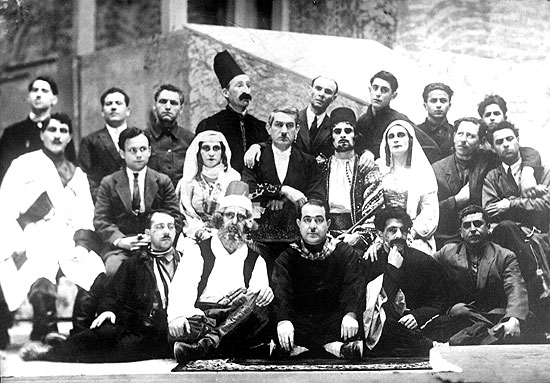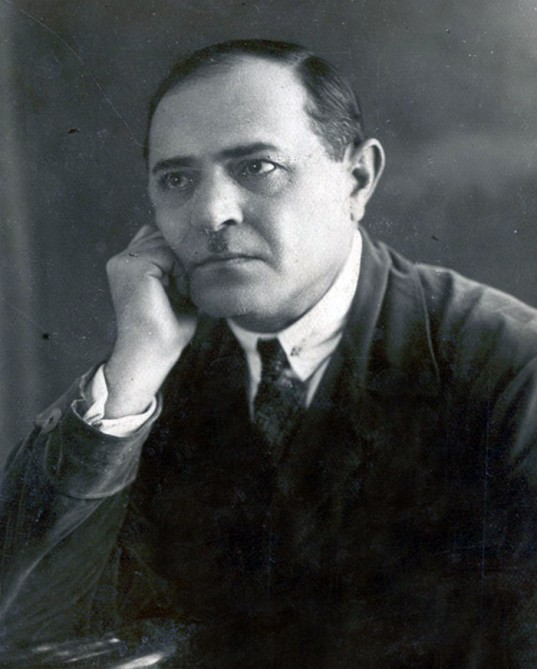
“Ashig Garib” is a mugham opera written by Zulfugar Hajibeyov in 1915 (in some sources 1916). It was first staged on May 13, 1916, by the troupe of Uzeyir Hajibeyov and Zulfugar Hajibeyov brothers on the stage of the Tagiyev’s Theater (The theater of Azerbaijani millionaire and philanthropist Haji Zeynalabdin Taghiyev was demolished in 1992, and later the current building of the Azerbaijan State Music Theater was built in its place) in Baku.
[D. Jabrayilbayli. Zulfugar Hajibeyov. 1985, p. 99-100]
[Encyclopedia of Azerbaijani mugham. 2012, p. 88]
[Great Soviet encyclopedia. 1st volume. 1949, p. 477]
Zulfugar Hajibeyov is the author of the opera’s libretto (the text of the musical-stage work) and the opera is probably based on the plot of the ashig’s story (epic) with the same name, which was widespread in Azerbaijan, Transcaucasia, Asia Minor and Central Asia in the 16th and 17th centuries. In the 1970 edition of the “Great Soviet Encyclopedia” “Ashig Garib” is shown as an anonymous romantic Azerbaijani epic. The Azerbaijani version of the epic “Ashig Garib” was written by Mikhail Yuryevich Lermontov who was a Russian poet, while he was in the Caucasus in 1837. It was published in 1846. According to the information given by specialist in folklore Ahliman Akhundov, the text of the epic which was written by the storyteller Mashadi-Dadash Ahmad oglu in the village of Ahmadli, Lachin region in 1944, coincides with the text of the fairytale written by Lermontov in many respects due to its certain plot sequence and characters.
[D. Jabrayilbayli. Zulfugar Hajibeyov. 1985, p. 97-98; 100]
[Great Soviet encyclopedia. 2nd volume. 1970, p. 472]
Zulfugar Hajibeyov himself participated actively in staging the opera “Ashig Garib” and acted as the conductor, i.e., the chief musical director of the performance. Huseyngulu Sarabski who was Azerbaijani opera singer and theater actor, played the role of Ashig Gharib, and Ahmad Bey (Badalbayli) Agdamski who was Azerbaijani opera singer, played the role of Shahsanam.
[D. Jabrayilbayli. Zulfugar Hajibeyov. 1985, p. 100]
[Theater encyclopedia. I volume. 1961, p. 66]
[G. Mammadli. Chronicle of Azerbaijani theater (1850-1920). 1975, p. 434]
Zulfugar Hajibeyov revealed the characters of the poetic folk tale “Ashig Garib” in music for the first time. He preserved the ideological basis of the folk source and the general sequence of the plot in the opera. He adapted it to the requirements of the musical scene.
Zulfugar Hajibeyov divided the entire epic into four major parts, each of which contains the basis of the content of one act. Each part is also divided by him into two relatively independent dimensions. Thus, there were four acts and eight scenes in the opera. The plot of the epic is compressed in accordance with the requirements of the stage action in the libretto.
[D. Jabrayilbayli. Zulfugar Hajibeyov. 1985, p. 101]

In the book “Zulfugar Hajibeyov”, which was written by J. Jabrayilbayli in 1986, noted:
“Ashig Garib” by Z.Hajibeyov brought a new spirit to the early works of Azerbaijani composers. Unlike other mugham operas, this work is filled with a bright lyrical mood, as well as characters of happy love. The opera of “Ashig Garib” borrowed a lot from the genre of fairy tales. It is revealed both in the development of the plot and in the image of the main characters – Shahsanam and Gharib – who vigorously fight for their happiness. “Ashig Garib” belongs to the fairy tale genre due to the harmony of music and fairy tales. Therefore, this opera can be deemed as a mugham – fairytale opera.”
[D. Jabrayilbayli. Zulfugar Hajibeyov. 1985, p. 104]
In 1916, the opera “Ashig Garib” was staged four times.
The premiere of the opera was described in “Kaspi” newspaper as follows:
“All the best representatives of the Muslim scene are performing. A large mixed choir consisting of men and women will perform up to 20 numbers of original and folk motifs. Sarabski and Aghdamski play the main roles. New decorations have been painted for the play. There are closed lodges.”
“On Friday, May 13, the hall was full of people at Z. Hajibeyov’ s new opera – “Ashig Garib”, which was staged at H.Z. Taghiyev’s theater. The opera was very interesting both for its music and content. The music is composed of melodic folk and original motifs (choir), classical arias and melodies from the East. The orchestra consisted only of Eastern musical instruments.”
[D. Jabrayilbayli. Zulfugar Hajibeyov. 1985, p. 100]
The performance of “Ashig Garib” was staged for the second time on May 20, 1916, and for the third time it was staged at the current Azerbaijan State Academic Opera and Ballet Theater (September 9, 1916). The stage director of this performance was Abbas Mirza Sharifzade (famous Azerbaijani film director). The performance was staged by the newly organized entreprise of the Hajibeyov brothers (a form of theater work organization where the organizer (entrepreneur) invites actors from various theaters in order to participate in the performance). The fourth play was staged on September 15.
[D. Jabrayilbayli. Zulfugar Hajibeyov. 1985, p. 101]
[G. Mammadli. Chronicle of Azerbaijani theater (1850-1920). 1975, p. 436; 447-448]

Another staging of the opera took place in the settlement of Sabunchi in 1929. The Azerbaijani composer Muslim Magomayev conducted the performance. Such actors as Hagigat Rzayeva (Shahsenem), Huseyngulu Sarabski (Ashig Garib) and others played in this production.
[D. Jabrayilbayli. Zulfugar Hajibeyov. 1985, p. 101]
[Theatre encyclopedia. IV volume. 1965, p.606
Zulfugar Hajibeyov was born on April 5(17), 1884 in Shusha. But the date of his birth is indicated as September 4(16) in Theatre encyclopedia. In 1899 Zulfugar Hajibeyov entered the Transcaucasian Teachers’ Seminary in Gori. Hajibeyov studied music on his own. Together with Uzeyir Hajibeyov who was his younger brother and other outstanding figures of Azerbaijan such as Muslim Magomayev, Huseyngulu Sarabski and Hanifa Teregulov, he promoted the unique national musical art of the Azerbaijani people. Zulfugar Hajibeyov is the author of the musical comedies such as “Young at Fifty Years Old” (1909), “Wealthy man” (“Eleven-year-old bride”) (1910-1911),” Single while Married” (1911), the cantata “For the 30th anniversary of Soviet Azerbaijan” and other works. In 1920-1930 he wrote several songs such as “Village Girl”, “Shepherd’s Daughter”, “Soldier’s Song” and etc. His two operas “Three ashiqs” (“Malikmammad”) and “Nushaba” remained unfinished. Zulfugar Hajibeyov died on September 30, 1950. He was buried on the Alley of Honor in Baku.
[Encyclopedia of Azerbaijani mugham. 2012, p. 88]
[Uzeyir Hajibeyov’ s encyclopedia. 2003, p. 65]
[Music Encyclopedia. 1st volume. 1973, p. 871]
[Azerbaijani Soviet Encyclopedia. X volume. 1987, p. 147]
[The Honorary Cemetery. 2007, p. 109]
[Theatre encyclopedia. I volume. 1961, p.1073]
[D. Ahmad. Selected. 2020, p. 177]




